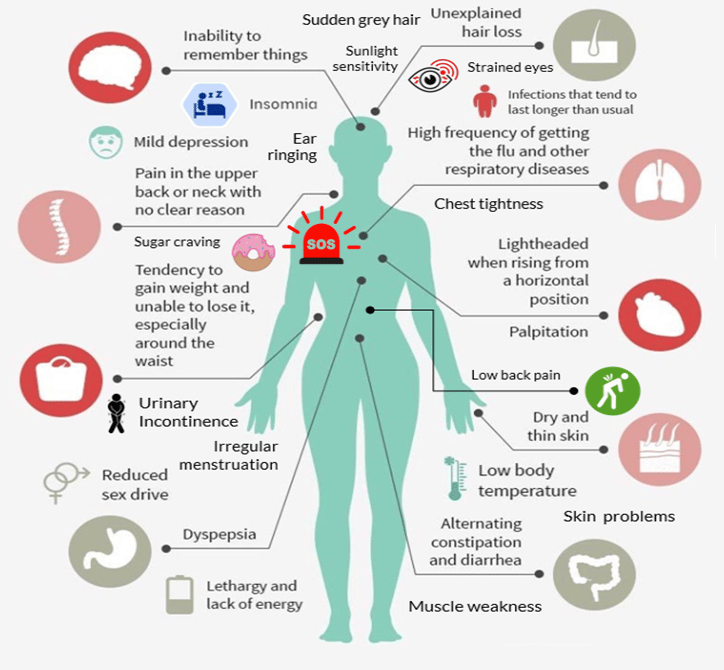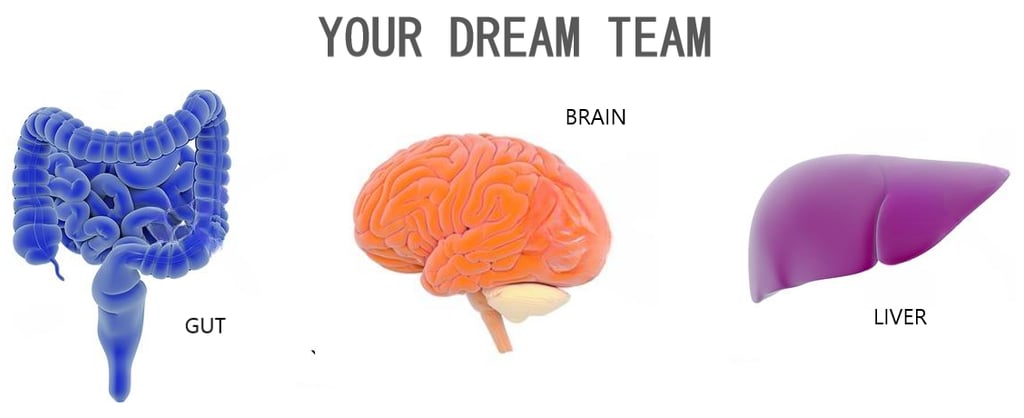

Why Restore Balance: Your Gut-Brain-Liver Axis Holds the Answer
Table of Contents:
Check out the image below—it’s a cool visual of how your gut, brain, and liver are all connected, constantly communicating with each other. Don’t worry if it looks a bit technical with the arrows and abbreviations—we’re here to keep things simple! This connection, known as the gut-brain-liver axis, plays a huge role in everything from digestion and mood to overall health.
Most people jump straight to treating symptoms—like diabetes meds or lung supplements—without addressing the root cause: imbalances in the gut-brain-liver axis. This interconnected system doesn’t just affect these three organs; when it’s out of sync, it can impact your entire body. By restoring balance first, you tackle the root of many health problems, paving the way for sustainable, holistic healing.
The Gut-Brain-Liver Axis
Your gut, brain, and liver form a powerful trio that works together to maintain your health. These organs are deeply interconnected, regulating everything from digestion and mood to detoxification and more. Together, they handle over a thousand vital processes in your body, ensuring balance and well-being.
But the story doesn’t end there. Imagine your body as a bustling city, where the gut, brain, and liver are like a council of wise leaders working in harmony. Now, add the immune and lymphatic systems to the mix—think of them as the city’s defense force and sanitation department. Together, this interconnected network shapes your health in ways you might not expect.
Even NASA recognizes the importance of this connection. Their research on "Understanding the Brain-Liver-Gut Axis during Spaceflight and Aging"—don’t worry, we’ve simplified it for a quick, easy read—highlights how this trio impacts health—not just on Earth, but even in the unique conditions of space!
Ready to explore how this city thrives—and what happens when its balance is disrupted? Dive into the full story here to uncover the fascinating connections between these systems and how they keep your body’s city running smoothly.
Our modern lifestyles—packed with late nights, sedentary habits, constant stress, too much screen time, exposure to pollution, chemicals, highly processed foods, and unhealthy habits like smoking or excessive alcohol—are breeding grounds for stagnancy. These habits, especially when taken to extremes, fall under the umbrella of too much of anything. Stagnancy hampers movement and disrupts flow. When things don’t flow, problems arise, leading to imbalances that throw your body out of sync.
Emotionally, it’s a rollercoaster—feeling sad one moment, overexcited the next, and then plummeting into frustration or exhaustion. Physically, it’s no different. Without flow, your gut, brain, and liver struggle to communicate, leaving you feeling stuck and out of balance.
Red Flags You Can't Ignore!
When these three—gut, brain, and liver—aren’t in sync, you start seeing trouble: hair acting out, feeling wiped out, tummy tantrums, skin playing games—yeah, they’ll show you the signs loud and clear, but subtle. While these symptoms might seem “common,” they are actually red flags that shouldn’t be ignored.
An imbalanced gut-brain-liver axis doesn’t just disrupt the immune and lymphatic systems—it can ripple through your entire body, throwing off heart rhythm, lung function, kidney health, bone strength, eye health, hormone balance, and more. It’s like a domino effect—one problem leads to another, often resulting in symptoms like GERD (gastroesophageal reflux disease), diabetes, obesity, and even the infamous ‘3 Highs’. If you’re curious about how to manage the 3 Highs, our article has you covered.


Unlock Their Power of Synergy
After spotting those common red flags signaling your body might need some extra care, it’s time to explore how a well-rounded supplement plan targeting the gut-brain-liver axis can help restore balance.
The key lies in synergy—not just in how your gut, brain, and liver work together, but also in how the right blend of botanical ingredients can amplify their combined power. Think of it as a team effort: when these systems and ingredients work in harmony, the whole becomes greater than the sum of its parts. This dual synergy—between your body’s systems and the botanicals that support them—creates a ripple effect of health benefits that extend far beyond the gut, brain, and liver.
Ready to see how this works? Dive into the next section, Why Supplements Matter, to explore how supplements can restore balance to your body’s root systems and create a strong foundation for overall health. Or learn more about the Magic of Botanical Synergy and how the right ingredients work together to amplify your health here.


Why Supplements Matter
So, why the fuss about supplements? Easy.
One, they help restore balance to your body’s root systems—particularly the gut-liver-brain axis. When these key systems are out of sync, everything else built on top, like your overall health, can become unstable. Just like a tree needs strong roots to grow, your body needs these core systems in balance to thrive. Click here to view my recommended supplements.
Two, they fill the nutrient gaps your diet might miss—like protein and essential multivitamins and minerals. Protein is a key building block for every cell in your body, while multivitamins ensure you get all the vital nutrients you need to thrive. These basic supplements form the foundation for maintaining overall health when your diet doesn’t fully meet your nutritional needs.
And three, they target specific areas with key nutrients—like vitamin C for immune support, lutein for eye health, or fiber for digestive health, including the maintenance of the gut mucus layer. These essential nutrients help keep specific parts of your body functioning at their best. Think of them as specialists zooming in on targeted health goals, such as glowing skin, stronger immune function, or even effective weight management.
But here’s the catch—many people focus on filling nutrient gaps (Reason 2) or targeting specific health goals (Reason 3) without addressing the root cause: an imbalanced gut-liver-brain axis (Reason 1). This approach is like watering the leaves of a tree while neglecting its roots. Sure, you might see short-term improvements, but without restoring balance to your body’s core systems, long-term health will remain out of reach.
That’s why restoring balance is essential! Without a strong foundation, even the best-targeted supplements can only do so much. Start with the roots—restore balance to your gut, liver, and brain—and everything else, from filling nutrient gaps to achieving specific health goals, will flourish.
Equally critical is the quality and efficacy of the supplements you choose. Impure or unsafe products, whether adulterated with inferior substitutes or contaminated with harmful substances like pesticides, can undermine your efforts. This makes understanding purity and traceability a top priority when selecting supplements. (But if traceability still doesn't carry a strong message home, consider these three key questions.)


Harness TCM’s Ancient Wisdom
In Traditional Chinese Medicine (TCM), it's all about balance. TCM practitioners believe that imbalances in the body's energy (Qi), as well as in Yin and Yang and the various organ systems, lead to discomfort and health issues. Rather than focusing solely on diseases, TCM aims to restore balance through herbs, botanical extracts, acupuncture, and lifestyle changes to achieve overall harmony and prevent illness. This philosophy aligns perfectly with our mission to keep the gut-brain-liver trio in sync, showcasing how ancient wisdom complements modern health practices.
TCM also highlights the interconnectedness of different organs, based on the Theory of the Five Elements. For example:
Kidneys and urinary bladder are linked to the ears, bones, and hair. Kidney health can influence hearing, bone strength, and hair vitality.
Liver and gallbladder are connected to the eyes and tendons. Imbalances in the liver can affect vision and flexibility.
Heart and small intestine are linked to the tongue and blood vessels. Heart health is reflected in speech and circulation.
Lungs and large intestine are connected to the nose, skin, and body hair. Respiratory and digestive health can affect your complexion and skin texture.
Spleen and stomach are linked to the mouth and muscles. Digestive imbalances can weaken muscle tone and appetite.
The exploration by TCM scientists underscores the growing recognition of TCM's potential to bridge traditional knowledge with modern scientific understanding, paving the way for future discoveries. Read The TCM Connection to the Gut-Brain-Liver Axis to find out more.


Your Body's Natural Balance
Nature’s balance, known as homeostasis, is all about constant adjustment. When external stressors disrupt your health, your body’s self-healing mechanisms kick in to restore balance. This is why keeping your gut, brain, and liver in sync is so important—they work together to maintain this delicate equilibrium.
Supplements, lifestyle choices, and holistic practices like Traditional Chinese Medicine (TCM) can all help support this dynamic balance. Even small changes, like ensuring you drink clean, mineral-rich water, can make a big difference. After all, water plays a critical role in digestion, detoxification, and cognitive function—key processes tied to your gut-brain-liver axis.
While you’re working on restoring balance, remember: it’s about supporting your body’s natural ability to adapt and thrive. Don’t stand in your own way—let your body’s natural healing processes do their job, and give it the support it needs to stay balanced.


2 Simple Steps to Start
By now, you’ve seen how deeply interconnected your gut, brain, and liver are—and why restoring balance is essential for your overall health. From recognizing the warning signs to understanding the power of synergy and the role of supplements, you’ve gained the knowledge to take control of your well-being.
But where do you start? The good news is, you don’t have to overhaul your life overnight. A simple, two-step approach can help you reset your gut-brain-liver axis and kickstart your journey to balanced health and wellness, making your dream team even more effective.


Critical Reminder: Your Health Won't Wait—Neither Should You!
By now, you've seen how deeply interconnected your gut, brain, and liver are in maintaining your overall health. The truth is, the serious conditions highlighted in studies—like liver damage, bone loss, or diabetes—are often the result of years of imbalances and long-term choices that go unchecked. These issues don’t happen overnight, and your gut-brain-liver axis is constantly working to keep your body in balance, even when symptoms aren't obvious.
But just because you're not feeling symptoms now doesn’t mean everything is fine. Don’t wait for illness to strike to realize these systems have been working in the background all along. Health doesn't just slip away suddenly—it’s shaped by daily habits, and the warning signs are often subtle.
Here’s the hard truth: Many people can afford to travel, dine out, or splurge on luxuries, but when it comes to their health, they often underestimate its importance, quickly saying, “Healthcare just isn’t in my budget right now.” They wait until they’re sick to take action, often relying on medications to manage symptoms rather than addressing the root cause. But shouldn’t your health be your top priority?
Ready to prioritize your health? Discover how our Affordable Health plan makes proactive care accessible for everyone. Or, check out before-and-after testimonials to see the impact this balance can have—and explore the recommended supplements to help restore it.



